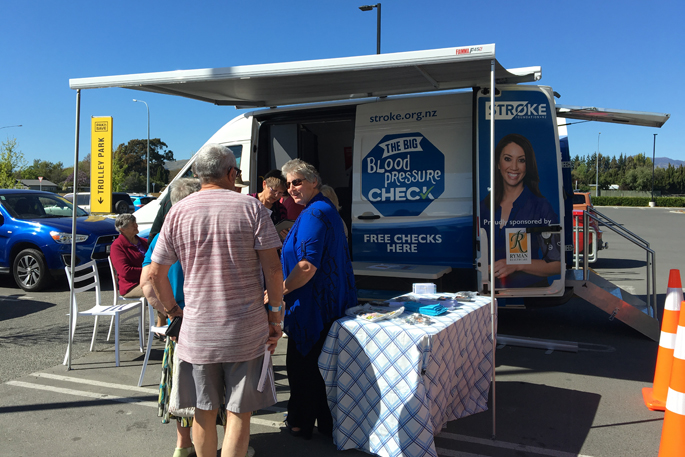People are being invited to a stroke awareness seminar in Tauranga this week to learn about the risks of having a stroke.
The Stroke Foundation NZ is hosting a community seminar at Arataki on Thursday to inform people about the risks of having a stroke, prevention signs and how to live after suffering one.
“Strokes are New Zealand's second single biggest killer and the leading cause of serious adult disability,” says a statement from the New Zealand Stroke Foundation.
“But many New Zealanders who have a stroke recover and lead successful, happy lives.”
According to the foundation, more than 9500 strokes are experienced each year, that’s one every 55 minutes.
To understand what strokes are, and what can people do either to prevent them or to know what to do after suffering one, SunLive talked with Stroke Foundation NZ Midland regional general manager Nicky Mayne.
She says a stroke is a brain attack which sometimes can be fatal.
“A stroke happens when a blockage, such as a clot, blocks the blood flow to the brain, or when a burst blood vessel bleeds into the brain.
“During a stroke, the cells in the affected part of the brain start to die and that part of the brain cannot work properly. It can affect anyone, at any age, including young people.”
Not all are bad news, says Nicky. Some strokes can be prevented.
Early detection and effective control of stroke risk factors can greatly reduce the possibility of stroke, she says.
“The number of people suffering a stroke would be reduced by 75 per cent if all recommended risk reduction strategies were taken in the community.
Strokes are usually the result of a combination of factors that have been present or developing for a long time.
If someone has two or more known stroke risk factors the chances of having a stroke can dramatically increase.
“High Blood Pressure and Atrial Fibrillation - irregular heartbeat - are two of these,” says Nicky.
Suffering a stroke can affect a person’s ability to walk, talk, eat, see, read, socialise or do things they were able to do before the stroke, says Nicky
“Many people with stroke may also have fatigue or problems with remembering, understanding or thinking properly.
“Stroke is the leading cause of adult disability in NZ, for those who experience a stroke under the age of 65, this can also have a significant impact on their financial situation and their relationships and wider whanau.”
According to Nicky, often a spouse, parent or child also needs to stop working to care for the person with a stroke, given that most stroke survivors are not eligible for ACC.
What can people do when suffering a stroke?
A stroke is a medical emergency and Nicky recommends calling 111 immediately if you find yourself or see anyone else experiencing any of the symptoms of a Stroke.
“Not all strokes are sudden and incapacitating. The sooner medical attention is received, the less damage a stroke will cause. “
Due to very few stroke survivors receiving ACC support, The Stroke Foundation is the national organisation dedicated to preventing stroke, improving outcomes and saving lives, says Nicky.
“Our Community Stroke Advisors work with people and whanau affected by stroke, and to do this we work together with a range of other groups and organisations to get the best outcomes for the stroke-affected community.”
Some of these people and organisations will also be presenting at the LAS, Life after Stroke seminar on Thursday, November 23.
Unfortunately, the Stroke Foundation only receives 17 per cent of the income needed to deliver services to people each year and we rely on the generosity of the community for the rest.”
Information and support can be found by accessing the website www.stroke.org.nz where people can find downloadable resources and contact information for the Community Stroke Advisor.
Stroke Foundation of New Zealand, also operates stroke groups to provide ongoing peer support and education, says Nicky.
People can live a good life after a stroke says Nicky, and to help them understand how to manage the risks of having one or having a normal life after, the Stroke Foundation of New Zealand is leading the LAS, Life After a Stroke seminar next week.
“Everyone’s experience of stroke is different, at this Life after Stroke seminar, participants can learn and receive support from others who have gone through a stroke journey, and also hear and ask questions of those who work to support people after a stroke.
“We also encourage people who work with or support people affected by stroke to attend.”
The Life After a Stroke seminar will take place in Heron room, Arataki Community Centre, Zambuk Way, Bayfair, on Thursday, November 23, at 10am.
What are the risk factors for a stroke?
Common risk factors include:
High blood pressure
Heart disease
Heart rhythm disorders e.g. atrial fibrillation
Smoking
Diabetes
High blood cholesterol
Use of oral contraceptives
Excessive alcohol intake
Being overweight
Family history



1 comment
The Master
Posted on 22-11-2023 12:17 | By Ian Stevenson
Yes all bad news and to a point preventable.
What is really concerning is the huge jump in reported numbers of heart attacks and strokes that have occurred since and including 2021 compared to decades prior, according to DHB annual data released for the period 2017-2023. Odd that? I wonder what the reason is?
Leave a Comment
You must be logged in to make a comment.